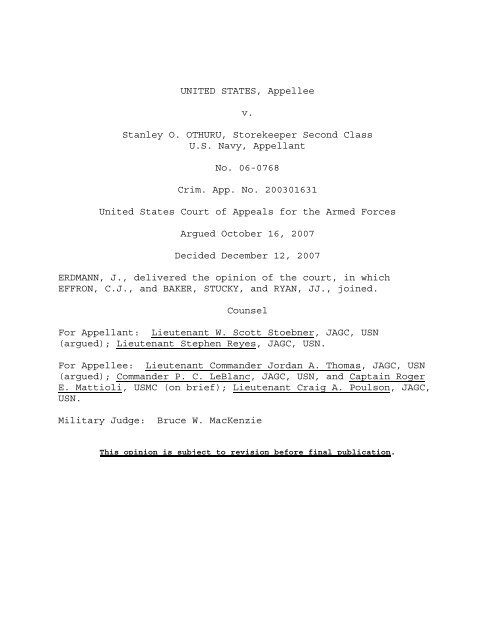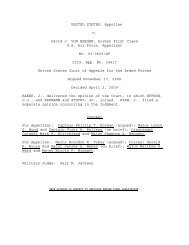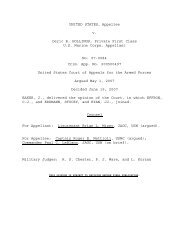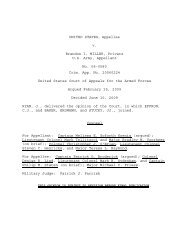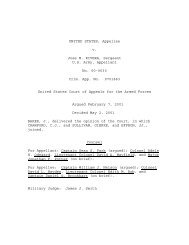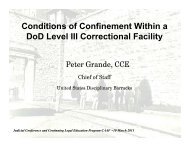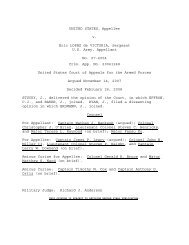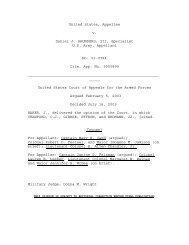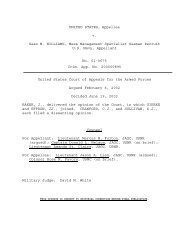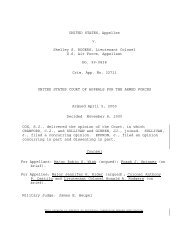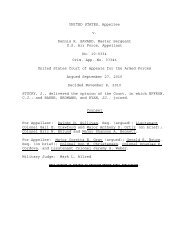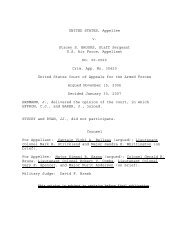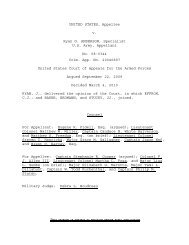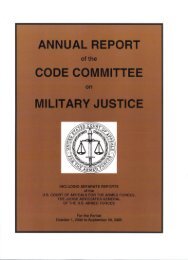U.S. v. Othuru - U.S. Court of Appeals for the Armed Forces
U.S. v. Othuru - U.S. Court of Appeals for the Armed Forces
U.S. v. Othuru - U.S. Court of Appeals for the Armed Forces
Create successful ePaper yourself
Turn your PDF publications into a flip-book with our unique Google optimized e-Paper software.
United States v. <strong>Othuru</strong>, No. 06-0768/NAJudge ERDMANN delivered <strong>the</strong> opinion <strong>of</strong> <strong>the</strong> court.Storekeeper Second Class Stanley <strong>Othuru</strong> was convicted at ageneral court-martial <strong>of</strong> making a false <strong>of</strong>ficial statement and<strong>the</strong>ft <strong>of</strong> government property as a consequence <strong>of</strong> his fraudulentcollection <strong>of</strong> basic allowance <strong>for</strong> housing (BAH) as a marriedservicemember while he was not legally married. He wassentenced to sixty days <strong>of</strong> confinement, reduction to E-3, and afine <strong>of</strong> $34,000.00. If <strong>the</strong> fine was not paid, <strong>the</strong> sentence hada provision <strong>for</strong> contingent confinement <strong>of</strong> one year. Theconvening authority approved <strong>the</strong> sentence and <strong>the</strong> United StatesNavy-Marine Corps <strong>Court</strong> <strong>of</strong> Criminal <strong>Appeals</strong> affirmed <strong>the</strong>findings and sentence. United States v. <strong>Othuru</strong>, No. NMCCA200301631, 2006 CCA LEXIS 139, 2006 WL 1663021 (N-M. Ct. Crim.App. June 13, 2006). We granted <strong>Othuru</strong>’s petition <strong>for</strong> grant <strong>of</strong>review and specified an additional issue. 11 We granted review <strong>of</strong> <strong>the</strong> following issue:WHETHER THE ADMISSION OF TWO SWORN OUT-OF-COURTSTATEMENTS FROM APPELLANT’S MOTHER AND WIFE WHOACCUSED APPELLANT OF ENTERING INTO A FRAUDULENTMARRIAGE IS HARMLESS BEYOND A REASONABLE DOUBT IN ACOURT-MARTIAL WHERE APPELLANT WAS CONVICTED FORFRAUDULENTLY COLLECTING BASIC ALLOWANCE FOR HOUSING(BAH) BY ENTERING INTO A FRAUDULENT MARRIAGE.We specified review <strong>of</strong> <strong>the</strong> following issue:WHETHER APPELLANT WAS DENIED DUE PROCESS OF LAW WHERETHE LOWER COURT DECIDED APPELLANT’S CASE 1,298 DAYSAFTER HIS COURT-MARTIAL.64 M.J. 440 (C.A.A.F. 2007).2
United States v. <strong>Othuru</strong>, No. 06-0768/NA<strong>Othuru</strong> asserts that he was prejudiced by <strong>the</strong> erroneousadmission <strong>of</strong> two testimonial hearsay statements which allegedthat his wife was actually his biological sister. See Craw<strong>for</strong>dv. Washington, 541 U.S. 36 (2004). He claims that <strong>the</strong>Government cannot meet its burden <strong>of</strong> showing <strong>the</strong> error washarmless beyond a reasonable doubt. We conclude that <strong>the</strong>erroneous admission <strong>of</strong> <strong>the</strong> hearsay statements was harmlessbeyond a reasonable doubt. There was also a delay <strong>of</strong> 1,298 daysbetween <strong>the</strong> end <strong>of</strong> <strong>Othuru</strong>’s trial and <strong>the</strong> date upon which <strong>the</strong>Navy-Marine Corps <strong>Court</strong> <strong>of</strong> Criminal <strong>Appeals</strong> rendered a decision.This delay raises an issue as to whe<strong>the</strong>r <strong>the</strong>re was a denial <strong>of</strong><strong>Othuru</strong>’s due process right to speedy post-trial review. Diaz v.The Judge Advocate General <strong>of</strong> <strong>the</strong> Navy, 59 M.J. 34, 37-38(C.A.A.F. 2003). We conclude that <strong>the</strong>re was no denial <strong>of</strong> dueprocess in <strong>the</strong> processing <strong>of</strong> <strong>Othuru</strong>’s appeal and <strong>the</strong>re<strong>for</strong>eaffirm <strong>the</strong> United States Navy-Marine Corps <strong>Court</strong> <strong>of</strong> Criminal<strong>Appeals</strong>.Harmless Beyond a Reasonable DoubtBackground<strong>Othuru</strong> is a native <strong>of</strong> Nigeria who immigrated to <strong>the</strong> UnitedStates and joined <strong>the</strong> United States Navy. He subsequentlybecame a citizen and applied <strong>for</strong> visas to have his parents andwife come to <strong>the</strong> United States. During <strong>the</strong> processing andreview <strong>of</strong> those visa applications in Nigeria, a suspicion arose3
United States v. <strong>Othuru</strong>, No. 06-0768/NAthat <strong>Othuru</strong>’s alleged wife, Michelle, was actually hisbiological sister. Under Nigerian law, a marriage to a bloodsibling is null and void. The United States Consulate initiatedan investigation and <strong>the</strong> matter was referred to a fraudinvestigator.The investigator interviewed Michelle and <strong>Othuru</strong>’s mo<strong>the</strong>r.Both women made oral and written statements to <strong>the</strong> investigatoradmitting that Michelle was <strong>Othuru</strong>’s biological sister.<strong>Othuru</strong>’s mo<strong>the</strong>r stated, “Michelle is our daughter and Stanley isour son and she is our last daughter and we are very sorry <strong>of</strong>what happened and sending such application.” Michelle wrote, “Iwish to confess that <strong>the</strong> petitioner Stanley Oghale <strong>Othuru</strong> is myolder bro<strong>the</strong>r and <strong>the</strong> first child <strong>of</strong> <strong>the</strong> family. This marriageis not valid. I am very sorry.”At <strong>the</strong> trial <strong>the</strong> military judge admitted <strong>the</strong> two hearsaystatements over defense counsel’s objections. The statementswere used by <strong>the</strong> Government to support charges that <strong>Othuru</strong> madean <strong>of</strong>ficial false statement and had engaged in BAH fraud byclaiming he was legally married to Michelle. The military judgeconcluded that <strong>Othuru</strong>’s mo<strong>the</strong>r and Michelle were unavailable aswitnesses and that <strong>the</strong> statements had particularized guarantees<strong>of</strong> trustworthiness. The statements were admitted as statementsagainst interest under Military Rule <strong>of</strong> Evidence (M.R.E.)4
United States v. <strong>Othuru</strong>, No. 06-0768/NA804(b)(3) or as family history under M.R.E. 804(b)(4). Nei<strong>the</strong>rMichelle nor <strong>Othuru</strong>’s mo<strong>the</strong>r testified at <strong>the</strong> trial.On appeal to <strong>the</strong> Navy-Marine Corps <strong>Court</strong> <strong>of</strong> Criminal<strong>Appeals</strong>, <strong>Othuru</strong> argued that <strong>the</strong> admission <strong>of</strong> <strong>the</strong> statementsviolated his Sixth Amendment right to confrontation. That courtfound <strong>the</strong> statements were testimonial under Craw<strong>for</strong>d and <strong>the</strong>ywere erroneously admitted. 2 <strong>Othuru</strong>, 2006 CCA LEXIS 139, at *6-*7, 2006 WL 1663021, at *2. The Navy-Marine Corps courtconcluded, however, that <strong>the</strong> evidence <strong>of</strong> guilt was overwhelmingand <strong>the</strong> error was harmless beyond a reasonable doubt. Id. at*10, 2006 WL 1663021, at *4.Discussion<strong>Othuru</strong> argues that <strong>the</strong> <strong>Court</strong> <strong>of</strong> Criminal <strong>Appeals</strong> erred indetermining that admission <strong>of</strong> <strong>the</strong> testimonial hearsay washarmless beyond a reasonable doubt. Although someconstitutional errors may be so fundamental as to be prejudicialin any event, see Chapman v. Cali<strong>for</strong>nia, 386 U.S. 18, 23 n.8(1967), not all constitutional errors require per se reversal:2 Craw<strong>for</strong>d was decided after <strong>Othuru</strong>’s court-martial. However,nei<strong>the</strong>r party has appealed <strong>the</strong> ruling <strong>of</strong> <strong>the</strong> Navy-Marine Corps<strong>Court</strong> <strong>of</strong> Criminal <strong>Appeals</strong> that <strong>the</strong> statements were testimonialhearsay and erroneously admitted. Nor has ei<strong>the</strong>r party arguedthat <strong>the</strong> lower court’s Craw<strong>for</strong>d ruling is “‘clearly erroneousand would work a manifest injustice’” if <strong>the</strong> parties were boundto it. United States v. Lewis, 63 M.J. 405, 412-13 (C.A.A.F.2006) (quoting United States v. Doss, 57 M.J. 182, 185 (C.A.A.F.2002)). Under such circumstances, we will treat <strong>the</strong> ruling aslaw <strong>of</strong> <strong>the</strong> case and binding on <strong>the</strong> parties. Id. at 413.5
United States v. <strong>Othuru</strong>, No. 06-0768/NA“[I]n <strong>the</strong> context <strong>of</strong> a particular case, certain constitutionalerrors, no less than o<strong>the</strong>r errors, may have been ‘harmless’ interms <strong>of</strong> <strong>the</strong>ir effect on <strong>the</strong> factfinding process at trial.”Delaware v. Van Arsdall, 475 U.S. 673, 681 (1986) (citationomitted). The Supreme <strong>Court</strong> has determined “that <strong>the</strong> denial <strong>of</strong><strong>the</strong> opportunity to cross-examine an adverse witness does not fitwithin <strong>the</strong> limited category <strong>of</strong> constitutional errors that aredeemed prejudicial in every case.” Id. at 682 (citingHarrington v. Cali<strong>for</strong>nia, 395 U.S. 250, 254 (1969)). As <strong>the</strong>error here involves <strong>Othuru</strong>’s Sixth Amendment right to crossexamine<strong>the</strong> witnesses, we may test this Confrontation Clauseerror <strong>for</strong> its effect upon <strong>the</strong> trial to determine whe<strong>the</strong>r <strong>the</strong>error was harmless beyond a reasonable doubt. See id. at 684.The Government bears <strong>the</strong> burden <strong>of</strong> establishing that aconstitutional error has no causal effect upon <strong>the</strong> findings.United States v. Simmons, 59 M.J. 485, 489 (C.A.A.F. 2004);United States v. Bins, 43 M.J. 79, 86 (C.A.A.F. 1995). To meetthis burden <strong>the</strong> Government must demonstrate that <strong>the</strong>re is noreasonable possibility that <strong>the</strong> presence <strong>of</strong> <strong>the</strong> two testimonialstatements contributed to <strong>the</strong> contested findings <strong>of</strong> guilty.United States v. Kreutzer, 61 M.J. 293, 300 (C.A.A.F. 2005)(citing Gutierrez v. McGinnis, 389 F.3d 300, 307-08 (2d Cir.2004)).To say that an error did not “contribute” to <strong>the</strong>ensuing verdict is not, <strong>of</strong> course, to say that <strong>the</strong>6
United States v. <strong>Othuru</strong>, No. 06-0768/NAjury was totally unaware <strong>of</strong> that feature <strong>of</strong> <strong>the</strong> triallater held to have been erroneous. . . .To say that an error did not contribute to <strong>the</strong> verdictis, ra<strong>the</strong>r, to find that error unimportant in relationto everything else <strong>the</strong> jury considered on <strong>the</strong> issue inquestion, as revealed in <strong>the</strong> record.Yates v. Evatt, 500 U.S. 391, 403 (1991), overruled on o<strong>the</strong>rgrounds by Estelle v. McGuire, 502 U.S. 62, 72 n.4 (1991). Itis in this light <strong>the</strong>n that we will not affirm <strong>Othuru</strong>’sconviction unless we are convinced beyond a reasonable doubtthat <strong>the</strong> “constitutional error was not a factor in obtainingthat conviction.” Kreutzer, 61 M.J. at 299. The determination<strong>of</strong> whe<strong>the</strong>r an error <strong>of</strong> constitutional dimension is harmlessbeyond a reasonable doubt is a question <strong>of</strong> law that we review denovo. United States v. Cendejas, 62 M.J. 334, 337 (C.A.A.F.2006); United States v. Hall, 56 M.J. 432, 436 (C.A.A.F. 2002).<strong>Othuru</strong>’s defense was that Michelle was actually “MichelleSamuel” and that she was <strong>the</strong> natural daughter <strong>of</strong> a friend <strong>of</strong><strong>Othuru</strong>’s fa<strong>the</strong>r. Michelle had been selected to become <strong>Othuru</strong>’swife at a very young age and had been given to his parents whoraised her in <strong>the</strong>ir family, allegedly a common practice inNigeria. <strong>Othuru</strong> argues that <strong>the</strong> Government has failed todemonstrate that <strong>the</strong>re is no reasonable possibility that <strong>the</strong> twostatements in issue contributed to <strong>the</strong> findings <strong>of</strong> guilty.Since <strong>the</strong> statements came from his mo<strong>the</strong>r and Michelle anddirectly contradicted his only defense, he argues that <strong>the</strong>y were7
United States v. <strong>Othuru</strong>, No. 06-0768/NA<strong>the</strong> heart <strong>of</strong> <strong>the</strong> Government’s case. He notes that <strong>the</strong> trialcounsel highlighted <strong>the</strong> statements referring to <strong>the</strong>m “[f]irstand <strong>for</strong>emost” during closing arguments. <strong>Othuru</strong> also notes that<strong>the</strong> only persons who could rebut <strong>the</strong> statements were unavailableto testify.The Government disputes that <strong>the</strong> statements were <strong>the</strong> focalpoint <strong>of</strong> <strong>the</strong> prosecution’s case and points out that <strong>Othuru</strong>presented a stipulation <strong>of</strong> Michelle’s expected testimony thatdirectly contradicted her testimonial statement. The Governmentalso argues that <strong>the</strong> statements were cumulative <strong>of</strong> o<strong>the</strong>rtestimony and evidence which established <strong>the</strong> fraudulent andinvalid nature <strong>of</strong> <strong>Othuru</strong>’s alleged marriage to Michelle.Finally, <strong>the</strong> Government argues that <strong>the</strong> evidence <strong>of</strong> guilt wasoverwhelming even in <strong>the</strong> absence <strong>of</strong> <strong>the</strong> contested statements.To determine whe<strong>the</strong>r <strong>the</strong> constitutional error was harmlessbeyond a reasonable doubt we consider <strong>the</strong> whole record. VanArsdall, 475 U.S. at 681. Reviewing this record we apply <strong>the</strong>balancing test established by <strong>the</strong> Supreme <strong>Court</strong>:The correct inquiry is whe<strong>the</strong>r, assuming that <strong>the</strong>damaging potential <strong>of</strong> <strong>the</strong> cross-examination were fullyrealized, a reviewing court might none<strong>the</strong>less say that<strong>the</strong> error was harmless beyond a reasonable doubt.Whe<strong>the</strong>r such an error is harmless in a particular casedepends upon a host <strong>of</strong> factors, all readily accessibleto reviewing courts. These factors include <strong>the</strong>importance <strong>of</strong> <strong>the</strong> witness’ testimony in <strong>the</strong>prosecution’s case, whe<strong>the</strong>r <strong>the</strong> testimony wascumulative, <strong>the</strong> presence or absence <strong>of</strong> evidencecorroborating or contradicting <strong>the</strong> testimony <strong>of</strong> <strong>the</strong>witness on material points, <strong>the</strong> extent <strong>of</strong> cross-8
United States v. <strong>Othuru</strong>, No. 06-0768/NAexamination o<strong>the</strong>rwise permitted, and, <strong>of</strong> course, <strong>the</strong>overall strength <strong>of</strong> <strong>the</strong> prosecution’s case.Id. at 684; United States v. Williams, 40 M.J. 216, 218-19(C.M.A. 1994) (citation omitted).Our review <strong>of</strong> <strong>the</strong> record under <strong>the</strong> Van Arsdall criteriaconvinces us that any error in admitting <strong>the</strong> statements <strong>of</strong>Michelle and <strong>Othuru</strong>’s mo<strong>the</strong>r was harmless beyond a reasonabledoubt. 3Although trial counsel did reference <strong>the</strong> testimonialstatements in both his opening statement and his final argument,<strong>the</strong> record reflects that <strong>the</strong> Government’s case did not hingeupon those statements alone.The Government introduced birth records through <strong>the</strong>testimony <strong>of</strong> Surajudeen Odesanyu, <strong>the</strong> Custodian <strong>of</strong> Records in<strong>the</strong> Lagos Island local government Birth and Death Registry. Thebirth registry reflected <strong>the</strong> birth <strong>of</strong> “Michelle <strong>Othuru</strong>” on June30, 1980, born to <strong>Othuru</strong>’s parents, and a certified copy <strong>of</strong> abirth certificate <strong>for</strong> “Michelle <strong>Othuru</strong>” corresponds to thatregistry. The Government also introduced hospital recordsthrough <strong>the</strong> testimony <strong>of</strong> Abimbola Benson, <strong>the</strong> chief healthrecord <strong>of</strong>ficer at <strong>the</strong> Lagos University Teaching Hospital. Thehospital records reflected that Atim <strong>Othuru</strong>, <strong>Othuru</strong>’s mo<strong>the</strong>r,3 Although <strong>the</strong> <strong>Court</strong> <strong>of</strong> Criminal <strong>Appeals</strong> cited <strong>the</strong> Van Arsdallcriteria, it appears to have relied upon only one criteria –-<strong>the</strong> overall strength <strong>of</strong> <strong>the</strong> Government’s case –- in finding that<strong>the</strong> error was harmless beyond a reasonable doubt. It is abetter practice to review and balance all <strong>of</strong> <strong>the</strong> Van Arsdall9
United States v. <strong>Othuru</strong>, No. 06-0768/NAentered <strong>the</strong> Lagos University Teaching Hospital on June 30, 1980,and gave birth to a female baby on that same day. Records fromtwo schools successively attended by Michelle reflected that“Michelle <strong>Othuru</strong>” was enrolled as a student, and witnessestestified that registration at both schools required asupporting birth certificate. There was no challenge to <strong>the</strong>validity <strong>of</strong> <strong>the</strong>se documents.In contrast, <strong>the</strong> birth certificate <strong>of</strong> “Michelle Samuel”submitted in support <strong>of</strong> Michelle’s visa application, was shownto be fraudulent. That birth certificate is dated April 15,1997, and certifies that “Michelle Samuel” was born on June 30,1980, coincidentally <strong>the</strong> same birth date <strong>of</strong> Michelle <strong>Othuru</strong>.Mr. Paul Adigwu, a civil servant in <strong>the</strong> National PopulationCommission <strong>for</strong> Nigeria, examined <strong>the</strong> exhibit and testified thatan actual birth certificate would not be a photocopy as is <strong>the</strong>“Samuel” certificate. He also testified that an actual birthcertificate would be smaller than <strong>the</strong> “Samuel” certificate andwould have per<strong>for</strong>ations along <strong>the</strong> left side. Adigwu fur<strong>the</strong>rstated that a photocopy <strong>of</strong> an actual birth certificate would nothave an original au<strong>the</strong>ntication stamp as does <strong>the</strong> “Samuel”certificate.Adigwu noted that he knew <strong>the</strong> <strong>of</strong>ficial who purportedlysigned <strong>the</strong> “Samuel” birth certificate and that <strong>of</strong>ficial had notcriteria in determining whe<strong>the</strong>r <strong>the</strong> error was harmless beyond a10
United States v. <strong>Othuru</strong>, No. 06-0768/NAper<strong>for</strong>med <strong>of</strong>ficial duties as a registrar since March 24, 1997,so he could not have signed a birth certificate dated April 15,1997. Adigwu had compared <strong>the</strong> “Samuel” birth certificate to <strong>the</strong><strong>of</strong>ficial birth registries in <strong>the</strong> local government <strong>of</strong>fices andfound no entry <strong>for</strong> <strong>the</strong> birth <strong>of</strong> a child named “Michelle Samuel.”Based on this review Adigwu testified that <strong>the</strong> “Samuel”certificate was an invalid birth certificate.This Government evidence demonstrates that <strong>the</strong> testimonialhearsay from Michelle and <strong>Othuru</strong>’s mo<strong>the</strong>r was not a necessarycomponent <strong>of</strong> <strong>the</strong> Government’s case. Overall, <strong>the</strong> prosecution’sevidence was strong. The two hearsay statements were cumulative<strong>of</strong> <strong>the</strong> documentary evidence reflecting that Michelle was <strong>the</strong>natural daughter <strong>of</strong> <strong>Othuru</strong>’s parents. Birth and school recordsexisted to show that Michelle was <strong>the</strong> daughter <strong>of</strong> <strong>Othuru</strong>’sparents. Additionally, <strong>the</strong> absence <strong>of</strong> any birth records and <strong>the</strong>apparently fraudulent birth certificate demonstrate <strong>the</strong>re was no“Michelle Samuel.” Adigwu’s testimony which indicated that<strong>the</strong>re was no such person as “Michelle Samuel” substantiallyundermined <strong>the</strong> defense <strong>the</strong>ory that “Michelle Samuel” had come tolive with <strong>the</strong> <strong>Othuru</strong>s at a young age and been treated like adaughter.While <strong>the</strong>re was no cross-examination <strong>of</strong> ei<strong>the</strong>r Michelle or<strong>Othuru</strong>’s mo<strong>the</strong>r as both had been deemed unavailable, <strong>the</strong> defensereasonable doubt.11
United States v. <strong>Othuru</strong>, No. 06-0768/NAdid read a stipulation <strong>of</strong> <strong>the</strong> expected testimony <strong>of</strong> Michelle.That stipulation refuted <strong>the</strong> substance <strong>of</strong> Michelle’s initialstatement to <strong>the</strong> fraud investigator and claimed that she made<strong>the</strong> statement only after several hours <strong>of</strong> being interviewed andunder pressure. There<strong>for</strong>e only <strong>the</strong> hearsay statement <strong>of</strong><strong>Othuru</strong>’s mo<strong>the</strong>r went unchallenged.<strong>Othuru</strong> argues that <strong>the</strong> circumstances <strong>of</strong> his case aresimilar to those <strong>of</strong> United States v. Hall, 58 M.J. 90, 95(C.A.A.F. 2003), where we concluded that an improperly admittedhearsay statement from Hall’s mo<strong>the</strong>r was not harmless beyond areasonable doubt. In Hall, <strong>the</strong> appellant had defended against<strong>the</strong> positive results <strong>of</strong> a urinalysis by claiming that she drank“Trimate” tea sent to her by her mo<strong>the</strong>r. Id. at 92. Hallpresented expert testimony that a positive result <strong>for</strong> cocainecould be obtained after drinking “Trimate” tea, a tea made from“decocainized” coca leaves. Id. Over defense objection, <strong>the</strong>military judge permitted <strong>the</strong> trial counsel to present rebuttalevidence through a law en<strong>for</strong>cement <strong>of</strong>ficial that Hall’s mo<strong>the</strong>rsaid she had never sent her daughter any tea. Id.The military judge <strong>the</strong>n instructed <strong>the</strong> members that <strong>the</strong>ycould only consider <strong>the</strong> mo<strong>the</strong>r’s statement <strong>for</strong> its impeachmentvalue, and not <strong>for</strong> <strong>the</strong> truth <strong>of</strong> <strong>the</strong> matter stated. Id. at 92-93. Be<strong>for</strong>e this court, <strong>the</strong> government conceded that <strong>the</strong>military judge erred by admitting Hall’s mo<strong>the</strong>r’s statements <strong>for</strong>12
United States v. <strong>Othuru</strong>, No. 06-0768/NA<strong>the</strong> purpose <strong>of</strong> impeaching Hall’s testimony. Id. at 91.Applying <strong>the</strong> factors from Van Arsdall, Hall is distinguishable.The testimony <strong>of</strong> Hall’s mo<strong>the</strong>r played a critical role in<strong>the</strong> prosecution’s case, undermining both <strong>the</strong> factual basis <strong>for</strong><strong>the</strong> innocent ingestion defense and Hall’s credibility. Hall’smo<strong>the</strong>r’s statement was not cumulative, nor was <strong>the</strong>re any o<strong>the</strong>revidence refuting <strong>the</strong> mo<strong>the</strong>r’s statement except Hall’s owntestimony, <strong>the</strong> credibility <strong>of</strong> which had been shattered by hermo<strong>the</strong>r’s statement. The case against Hall was based upon apositive urinalysis which we noted was not synonymous with“conviction.” Id. at 94. In short, <strong>the</strong> factors balanced inHall stand in contrast to <strong>the</strong> overall record and factors presentin <strong>Othuru</strong>’s case.After considering <strong>the</strong> record as a whole and balancing <strong>the</strong>Van Arsdall factors, we conclude that <strong>the</strong> testimonial hearsaystatements from Michelle and <strong>Othuru</strong>’s mo<strong>the</strong>r did not contributeto <strong>Othuru</strong>’s conviction. Any error in admitting <strong>the</strong>se twostatements was harmless beyond a reasonable doubt.Appellate DelayBackground<strong>Othuru</strong> was sentenced on November 23, 2002. The conveningauthority took action on June 20, 2003. The case was docketedbe<strong>for</strong>e <strong>the</strong> Navy-Marine Corps court on August 21, 2003. OnJanuary 31, 2005, appellate defense counsel filed a brief on13
United States v. <strong>Othuru</strong>, No. 06-0768/NAbehalf <strong>of</strong> <strong>Othuru</strong>. The Government filed its answer on November18, 2005. The lower court issued its decision in this case onJune 13, 2006 -- 1,298 days after <strong>Othuru</strong> was sentenced.DiscussionWe specified an issue to consider whe<strong>the</strong>r <strong>Othuru</strong> was denieddue process by <strong>the</strong> 1,298 days that elapsed between his trial andcompletion <strong>of</strong> appellate review by <strong>the</strong> Navy-Marine Corps court.We review whe<strong>the</strong>r <strong>Othuru</strong> was denied due process de novo using<strong>the</strong> methodology <strong>for</strong> reviewing issues <strong>of</strong> post-trial and appellatedelay set out in United States v. Moreno, 63 M.J. 129 (C.A.A.F.2006). We ask first whe<strong>the</strong>r <strong>the</strong> particular delay is faciallyunreasonable. Id. at 136. If we conclude that <strong>the</strong> delay isfacially unreasonable, we <strong>the</strong>n examine <strong>the</strong> four factors set<strong>for</strong>th in Barker v. Wingo, 407 U.S. 514, 530 (1972): (1) <strong>the</strong>length <strong>of</strong> <strong>the</strong> delay; (2) <strong>the</strong> reasons <strong>for</strong> <strong>the</strong> delay; (3) <strong>the</strong>appellant’s assertion <strong>of</strong> <strong>the</strong> right to timely review and appeal;and (4) prejudice. See United States v. Young, 64 M.J. 404,408-09 (C.A.A.F. 2007); Moreno, 63 M.J. at 135-36; United Statesv. Jones, 61 M.J. 80, 83 (C.A.A.F. 2005); Toohey v. UnitedStates, 60 M.J. 100, 102 (C.A.A.F. 2004).The delay from trial to completion <strong>of</strong> review at <strong>the</strong> <strong>Court</strong><strong>of</strong> Criminal <strong>Appeals</strong> was three years, six months, and twentydays. In our view, this delay is facially unreasonable and14
United States v. <strong>Othuru</strong>, No. 06-0768/NA<strong>the</strong>re<strong>for</strong>e sufficient to trigger an analysis <strong>of</strong> <strong>the</strong> four Barkerfactors. This unreasonable delay would cause <strong>the</strong> first factor-- length <strong>of</strong> <strong>the</strong> delay -- to favor <strong>Othuru</strong>. As reason <strong>for</strong> <strong>the</strong>delay, <strong>the</strong> Government has pointed to <strong>the</strong> length and complexity<strong>of</strong> <strong>the</strong> record, but acknowledges that <strong>the</strong>re is no reason <strong>for</strong> <strong>the</strong>delay at <strong>the</strong> appellate level in this case. Even assuming thatthis record may have been more difficult to prepare than o<strong>the</strong>rs,we conclude that <strong>the</strong>re is no good cause <strong>for</strong> <strong>the</strong> lengthy delayherein and that <strong>the</strong> second factor favors <strong>Othuru</strong>.<strong>Othuru</strong> did not complain about <strong>the</strong> delay in his case untilhe filed his initial brief at <strong>the</strong> <strong>Court</strong> <strong>of</strong> Criminal <strong>Appeals</strong>.Such an assertion is not timely, and <strong>the</strong> third factor weighsslightly against <strong>Othuru</strong>. See Moreno, 63 M.J. at 138. Finally,we discern no basis <strong>for</strong> a finding <strong>of</strong> prejudice in this case.<strong>Othuru</strong> has not prevailed on any o<strong>the</strong>r substantive issue and noprejudice is manifest on this record. This fourth and finalfactor weighs against <strong>Othuru</strong>. Balancing all <strong>the</strong>se factors, weconclude that <strong>the</strong>re is no denial <strong>of</strong> <strong>Othuru</strong>’s due process rightto a timely review and appeal.DecisionThe decision <strong>of</strong> <strong>the</strong> United States Navy-Marine Corps <strong>Court</strong><strong>of</strong> Criminal <strong>Appeals</strong> is affirmed.15


